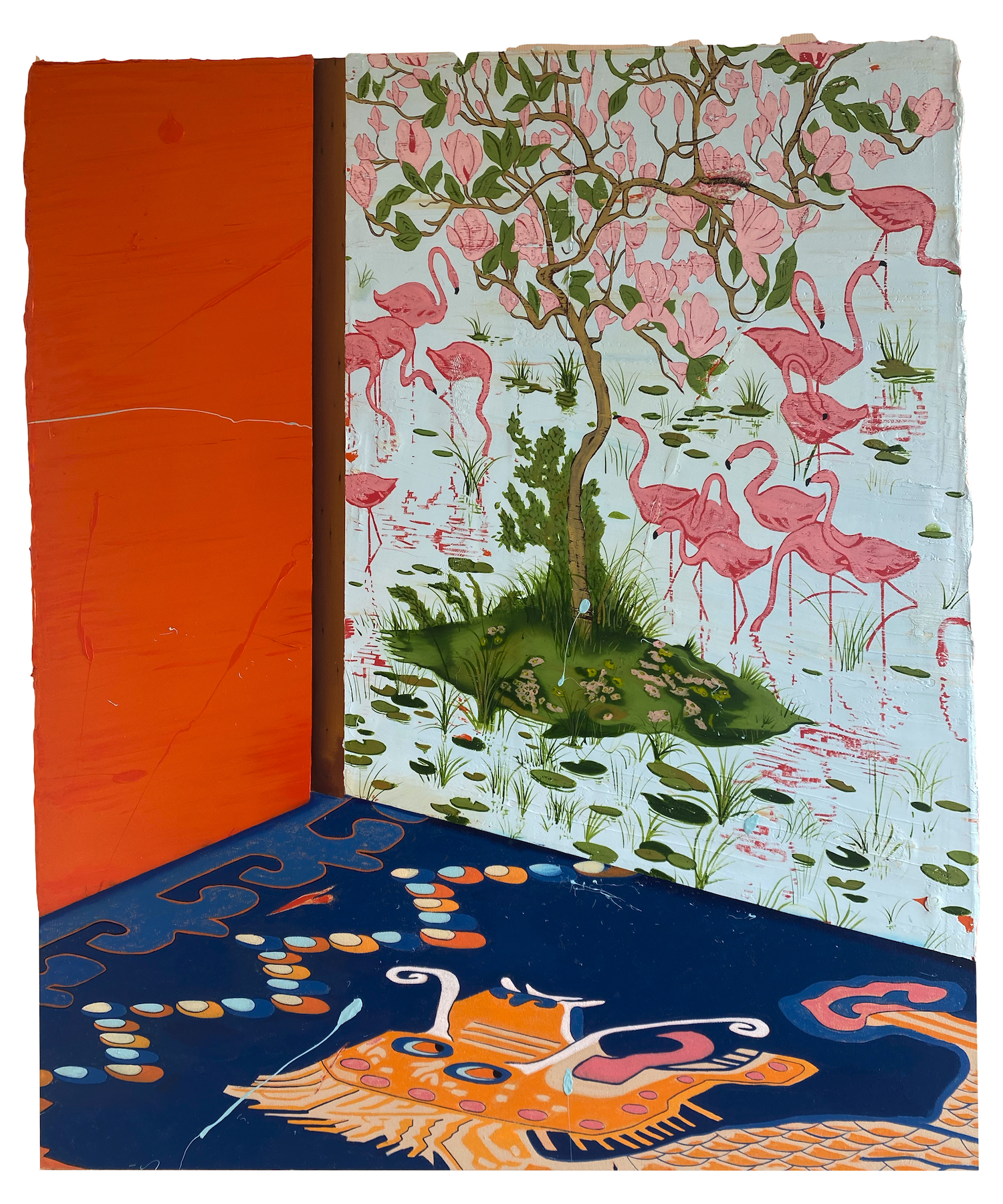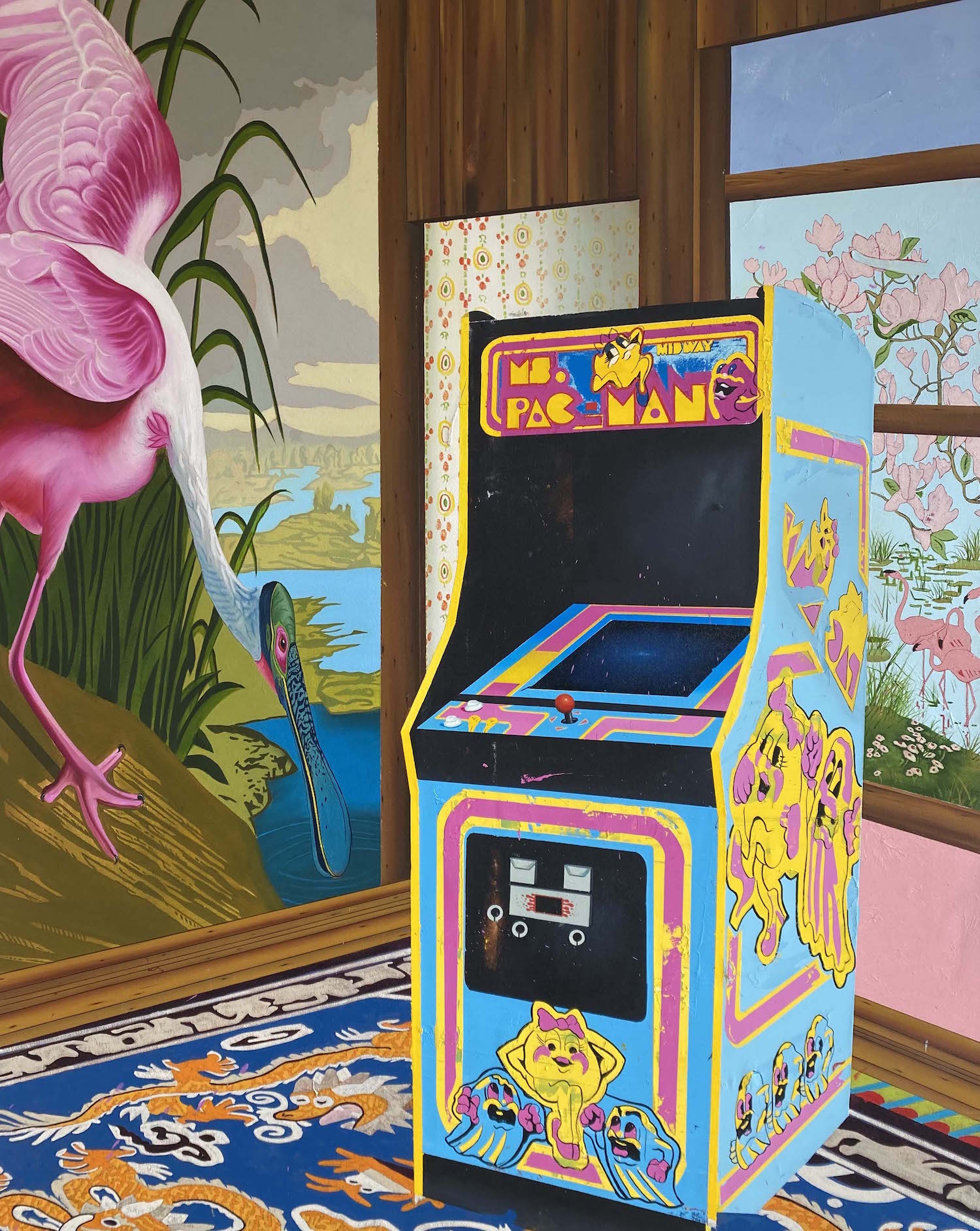Isaac Wong on Stephen Thorpe
by Isaac Wong
16 Sep 2021
 Stephen Thorpe, Daydreaming Transports the Dreamer Outside the Immediate World to a World That Bears the Mark of Infinity, 2020, oil on canvas, 92 x 76 cm. Image courtesy of the artist and Ora-Ora.
Stephen Thorpe, Daydreaming Transports the Dreamer Outside the Immediate World to a World That Bears the Mark of Infinity, 2020, oil on canvas, 92 x 76 cm. Image courtesy of the artist and Ora-Ora.
I remember the first time meeting Stephen Thorpe in 2019 at his test lecture at the former campus of Savannah College of Art and Design (SCAD) Hong Kong where Stephen shared his early work with us. Who would have thought that months later he would be teaching me conceptualisation techniques for my final year project?
I have to say that the method he taught me on how to generate authentic ideation struck me the most. The method itself is nothing revolutionary but it is a slap in the face everyone needs to progress forward. For everyone, it is often hard to get rid of things you have an attachment to, especially for artists and paintings they created. It is to toss, not the first or second, but all initial few ideas that you have on expressing certain themes to truly filter out all the conventional, preconceived story-telling skills.
 Stephen Thorpe, Night Through Dreams, Tell the Myths Forgotten by the Day, 2020, oil on canvas, 120 x 100 cm. Image courtesy of the artist and Ora-Ora.
Stephen Thorpe, Night Through Dreams, Tell the Myths Forgotten by the Day, 2020, oil on canvas, 120 x 100 cm. Image courtesy of the artist and Ora-Ora.
Some might say, if it ain’t broken, why bother to fix it? In a way, this thinking is not wrong. However, in reality, we all get bored by seeing the same trick over and over again. We need constant stimulants. Perhaps it is why Stephen’s work is perpetually captivating. In Nights Through Dreams, Tell the Myths Forgotten by the Day, like all of Stephen’s paintings, he utilises various psychoanalytical techniques to gain access and understand the objects that appear in his dreams and later translate onto his work, imbued with symbolism. The flamingo and the dragon depicted in this painting both embody different meanings. While flamingoes can symbolise femininity, beauty and grace, the dragon can be interpreted as power and strength in the East and destruction and chaos in the West. This contrast of duality and polarity continued to shine through this new body of work in his first solo exhibition in Asia, “Semi-conscious”, which took place in November 2020 in Hong Kong. With paintings spotlighting on the subject of arcades and corners, Stephen is truly bringing forth his deep knowledge of art history and theorems, while presenting it in an unorthodox view.
The fabrics of Stephen’s work is woven together with themes like psychoanalysis, sociology, folklore, mythology, and multiple other ideas. Predominantly, his work draws inspiration from Carl Jung as well as Gaston Bachelard’s 1958 book titled The Poetics of Space, then manifests itself in an interior structure. For him, the act of painting is to deepen the understanding of oneself.
Even without the rich layers of concept, Stephen’s work remains visually impactful and, to say the least, a living textbook. The paintings are a mixture of representation and abstraction (both Lyrical and Geometric). With a conscious decision of applying various colour palettes, the work evokes certain emotions precisely. Using design principles, like The Rule of Thirds, to stitch panels with different style of paintings onto a singular plan in unity, it sounds impossible even when I describe it, but Stephen does it harmoniously.
I remember vividly seeing his large-scale, omni-visioned interior spaces with familiar objects in his presentation. Slowly, this presentation becomes more pinpointed and only focuses on just a part of the interior. Stephen continues to explore, broaden, and develop these rooms and recesses of the mind. It gives me joy to see how an artist is growing and developing their practice.
 Stephen Thorpe, Until You Make the Unconcious Concious, It Will Direct Your Life and You Will Call It Fate, 2020, oil on canvas, 151 x 120 cm. Image courtesy of the artist and Ora-Ora.
Stephen Thorpe, Until You Make the Unconcious Concious, It Will Direct Your Life and You Will Call It Fate, 2020, oil on canvas, 151 x 120 cm. Image courtesy of the artist and Ora-Ora.
I have the privilege of knowing Stephen Thorpe as my mentor and an artist I admire. I am always amazed by his rigorous schedule in balancing being an educator and an artist, teaching in the US time zone while living and working in Hong Kong. I think this organised and methodical way of planning almost takes the fun out, but it is the path to success.
Stephen Thorpe (b.1981, Margate, UK) is currently based between Hong Kong and Atlanta, USA, where he is a Professor of Painting of the Savannah College of Art and Design (SCAD). He is represented by Ora-Ora, Hong Kong.

